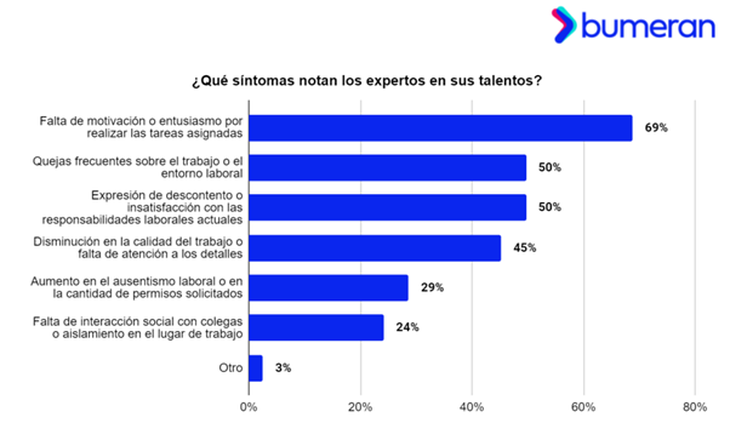According to a report released by Boomerangthe leading app for job offers, the 86% Of the Human Resources specialists surveyed in the country stated that workers suffer from Boreouta syndrome that describes a state of exhaustion and lack of interest caused by work tasks. The figure drops to 83% in Chile, 81% in Ecuador and Peru, and 78% in Panama.
Boreout Boomerang.png
What factors contribute to the development of boreout in the workplace?
One third of specialists consider that the Lack of recognition or appreciation from superiors It is one of the main factors contributing to the development of Boreout in the work environment; 20% believe that it is theto monotony and repetitiveness in work activities and 19% mention the absence of challenges or interesting tasks. The latter is a consequence, according to most of the workers’ responses, of the Lack of alignment between tasks and personal/professional interests.
Also, according to the survey, 82% of workers consider that they are carrying out tasks that are below their capabilities at work, when in Chile 77% feel the same; in Peru 76%; in Ecuador 69%; and in Panama 68%.
The consequences of Boreout
69% of specialists indicated that among the most common symptoms observed in their employees is lack of motivation or enthusiasm to carry out the assigned tasks and 50% mention Frequent complaints about work or the work environment.
Boreout Boomerang 2.png

In parallel, 26% of Human Resources professionals consider that this decreases organizational commitment; 24% think that affects the quality of work; and 16% indicate that it occurs loss of talents.
As a result of the lack of stimuli, Bumeran’s work showed that 92% of working people consider changing jobs.
What do experts do once they detect it?
55% of specialists do not implement any measures to solve the scourge of boredom and lack of motivation of their employees; 10% work together with talents to identify personalized solutions that can improve their work situation; and 9% offer emotional support.
Regarding measures to avoid or prevent the syndrome, 36% indicate that they promote a positive and collaborative work environment.; 27% say they take other measures, such as listening or support; and 17% assign special or challenging projects that allow employees to use and develop new skills.
“Faced with this situation, It is crucial that institutions define and implement strategies to avoid demotivation and enhance talent.“, explained Federico Barni, CEO of Jobint.
Source: Ambito
I am an author and journalist who has worked in the entertainment industry for over a decade. I currently work as a news editor at a major news website, and my focus is on covering the latest trends in entertainment. I also write occasional pieces for other outlets, and have authored two books about the entertainment industry.




